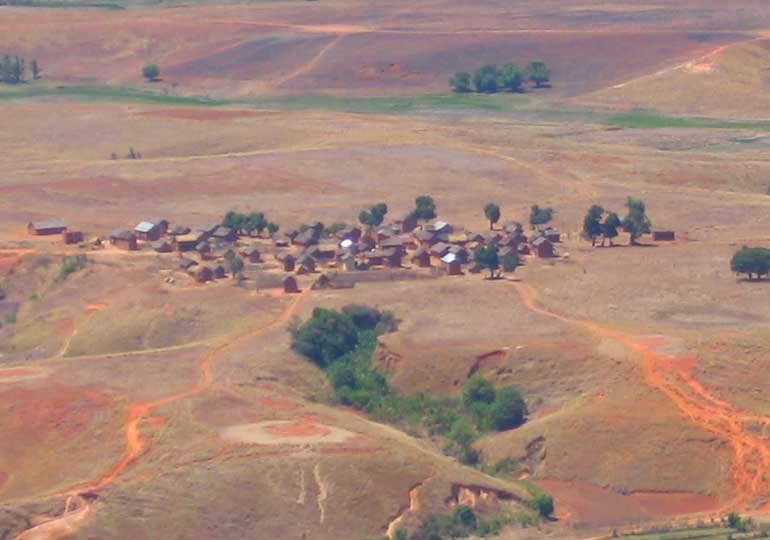FIADANANA - WORKING WITH A RURAL VILLAGE IN MADAGASCAR
OUR DEVELOPMENT PLANS (short version text from 2005 when we just started)
 Fiadanana
(the word for "peace" in Malagasy)
is a typical rural village in the countryside, surrounded by rice fields.
With a population of subsistence farmers, their only source of possible
income is from growing rice and corn, and raising cattle. Fiadanana is
surrounded by rice fields and has no electricity, running water, television
or telephone. Nobody in the village owns a motorized vehicle.
Fiadanana
(the word for "peace" in Malagasy)
is a typical rural village in the countryside, surrounded by rice fields.
With a population of subsistence farmers, their only source of possible
income is from growing rice and corn, and raising cattle. Fiadanana is
surrounded by rice fields and has no electricity, running water, television
or telephone. Nobody in the village owns a motorized vehicle.
At an initial daylong meeting in Fiadanana attended by the entire village
and a subsequent shorter meeting, representatives of Zahana discussed ideas
with the community. Key priorities emerged:
• Access to Clean
Water. For achievements since 2005 click
here
• Building a School.
(For photos of the new school from 2007 click
here)
• Improved Cook Stoves. •
Improved cook stoves in action
• A Communal Rice
Storage Facility
• A Microcredit System for Fiadanana
• Health Care Center.
• Fattening Cattle and Combating Alcoholism
Zahana will work together with the villagers on the priorities set by them. As a corner stone of our work the villagers will contribute their labor and locally available materials to all the projects. For example: the bricks needed for the planned buildings will be made in the village and be part of their contribution to the development effort. This helps to reduce costs, and involves the villagers in very step of their development as partners. More about this participatory approach can be found in the individual chapters about the planned projects on this web site.
What happened since 2005? In short:
• Zahana started working with a second community in the village of Fiarenana
• The villagers, with the help
of Zahana, have built their permanent water system. (more)
• The school for the village was built by the community. (more)
• The grain storage for the village was built by the community. (more)
• Construction materials not available locally, were bought by Zahana
and delivered to the village. (more)
• The villagers made and contributed the bricks for the school and grain
storage. (more)
• Fruit trees, a school garden and a living fence were planted in August
2006 to prepare for the school inauguration. (more)
• A team of doctors visited the village to get an assessment of the
health needs of the village. (more)
• Mosquito nets for malaria prevention were distributed to all households. (more)
• In a big one-day clean up effort the village has been cleaned of dust,
trash and debris, to improve overall hygiene and combat Tugiasis. (more)


For the in-depth version of this text from 2005 please click here










